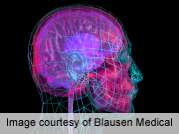Scientists pinpoint how deep brain stimulation eases OCD

(HealthDay)—Deep brain stimulation has helped people with severe obsessive-compulsive disorder, and new research begins to explain why.
A Dutch study appearing in the Feb. 24 online issue of the journal Nature Neuroscience found the procedure essentially restored normal function in a part of the brain called the nucleus accumbens.
The nucleus accumbens "is part of a greater brain network," explained study author Dr. Martijn Figee. "This network is involved in motivation and the processing of rewards, and its activity is disturbed in [obsessive-compulsive disorder], probably explaining why [patients] are stuck in pathological behaviors at the cost of healthy ones."
So, obsessive-compulsive disorder (OCD) is essentially the result of faulty wiring in the brain.
It's not so much a disorder of a specific part of the brain than it is a "disorder of neurocircuitry," explained Dr. Brian Snyder, director of functional and restorative neurosurgery at Winthrop University Hospital in Mineola, N.Y.
About 1 percent of U.S. adults suffer from the condition, which involves unwanted, intrusive thoughts or obsessions that then spur compulsive behavior.
While a person without OCD might momentarily worry that he or she has forgotten to lock the door, that thought is quickly balanced by the realization that, yes, the door has indeed been locked.
For a person with OCD, on the other hand, the thought that the door is unlocked will recur and fall into a repetitive pattern of thinking (obsession) and checking to make sure the door is locked (compulsion).
Dr. Wayne Goodman, professor and chair of psychiatry at Mount Sinai Hospital in New York City described OCD as a kind of "reverberating circuit."
Deep brain stimulation (DBS), which is widely used for severe Parkinson's and experimentally to treat major depression, has limited approval in the United States to treat OCD that hasn't responded to other treatments.
But experts haven't been sure why the procedure worked.
This study involved 16 patients with OCD and 13 healthy controls, all of whom had electrodes implanted in the nucleus accumbens area of the brain. They then underwent functional MRI brain scans while performing a task that involved the anticipation of reward (the type of activity that might trigger OCD).
OCD symptoms improved an average of 50 percent while brain activity—not only in the nucleus accumbens but also in a larger brain network—was normalized, said Figee, who is a psychiatrist with the DBS psychiatry department at Academic Medical Center in Amsterdam, the Netherlands.
"This may explain why patients with DBS experience very fast changes in a wide array of motivational and behavioral problems," he added. "This is clinically important because it indicates that DBS could also help for other disorders that have similar network disturbances, like addiction or eating disorders."
Several centers in Europe and the United States now use DBS for psychiatric illnesses, said Figee.
Accessibility and insurance coverage vary greatly, although Medicaid sometimes covers it, said Goodman.
But choosing appropriate candidates for the procedure can be daunting, as they need to have failed multiple medications as well as cognitive behavioral therapy, said Snyder. Cognitive behavioral therapy is a treatment that helps patients try to change their thoughts, feelings and behaviors. The patients also need to be free of other psychiatric disorders.
Although benefits appear to be long lasting, the procedure is not a cure, Snyder noted.
"It provides significant symptomatic benefits," he said. "It could mean the difference between being able to go out of the house and going to a job and being stuck in the house or an institution all the time."
More information: Paper: DOI: 10.1038/nn.3344
The U.S. National Institute of Mental Health has more on obsessive-compulsive disorder.
Health News Copyright © 2013 HealthDay. All rights reserved.















